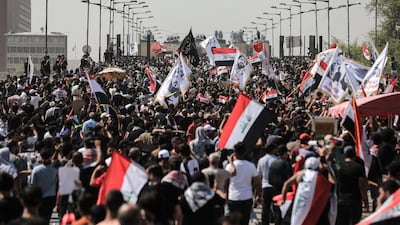A prominent opposition group in Iraq said security forces arrested one of its leaders on Monday over criticism of the government.
The home of activist and analyst Mohammed Naana in Baghdad was raided after a lawsuit filed by Prime Minister Mohammed Shia Al Sudani, Rejection Group said.
“The Rejection Group expresses its strong condemnation for the arrest of one its leading members after raiding his house,” it said.
It reaffirmed its “stance that rejects undermining and confiscating the rights that guarantee freedom of opinion and expression”, demanding his immediate release.
Iraqi judiciary and security forces have not issued any clarification. Requests for comments from The National went unanswered.
Since last year, Mr Naana has faced three lawsuits; one filed by Mr Al Sudani and two others by the legal representative of the cabinet, his lawyer Ahmed Al Bawi told local media.
He was jailed for 12 days before being brought before a judge who gave him a suspended six-month sentence with a fine, but the Prime Minister filed an appeal, added the lawyer.
“It is still unclear who has arrested him – probably the National Security Service – as well as his whereabouts,” said Mr Al Bawi.
“It is an attempt to muzzle voices and curtail freedom of expression.”
Rejection Group is one of several opposition parties formed after the 2019 pro-reform protests that broke out in Iraq.
The group does not have members in parliament as it boycotted previous elections, demanding reforms to the electoral system that would allow smaller parties to win seats and challenge the current sectarian-based political system.
Mr Naana is known for his outspoken criticism of Mr Al Sudani and the Iran-backed Shiite political parties and militias that support him and his government.
His arrest caused uproar among some Iraqis, who accused the Prime Minister of trying to silence the opposition.
Muhi Al Ansari, chairman of the Iraqi Home Movement, another opposition group that boycotted elections, said on X that Iraq is entering “into a critical stage in the history of its ruling regime” and the arrest “destructs the last stronghold of the fragile democracy in the country”.
Addressing the Prime Minister, activist Ali Fadhil wrote: “When you cut off someone’s tongue, you are not proving in any way that he is a liar, but rather you are clearly telling the world that you are afraid of what he will say.”
In October 2019, Iraqis took to the streets of Baghdad and other major cities in the Shiite heartland of central and southern Iraq to protest against the political elite who have been in power since the 2003 US-led invasion that toppled Saddam Hussein.
Their demands included not only jobs, better services and an end to endemic corruption, but also an overhaul of the post-Saddam political system.
The largest protests since 2003 led to the resignation of the government and the approval of a new law that led to early elections in October 2022, but these achievements came at a heavy price.
Demonstrations were met with a heavy-handed crackdown from security forces and Iran-backed militias.
Nearly 600 protesters and members of the security forces were killed in the violence, while tens of thousands were wounded.
Dozens of activists reported intimidation from security forces and militias and many were kidnapped or assassinated.
Activists accused Iran-backed militias of being behind the assassinations to try to subdue the protests. The government and militias blamed “third parties”, without specifying who they were.
In early 2020, the protests ended due to the crackdowns and the coronavirus pandemic. Dozens of independent candidates who took part in the protests managed to win seats in the October 2021 elections.
Despite their win, they failed to unite and win a significant number of seats in parliament.


